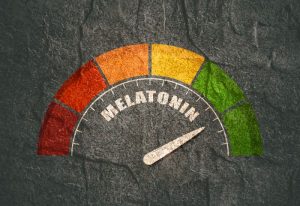A new study adds to the body of knowledge linking melatonin to better COVID-19 treatment outcomes. According to new research published in the Journal of the American Board of Family Medicine, using melatonin for COVID-19 can help improve symptoms, helping people with the illness to feel better faster. This recent study was a carefully structured clinical study that involved 98 people: all outpatients with mild-to-moderate COVID-19 symptoms.
While melatonin is best known for its role in healthy sleep, it has been shown to have a positive impact on health in a variety of ways, including helping to combat viruses.
Study Reveals Melatonin Beneficial for COVID-19
 In the recently published study, the team of Penn Medicine/Lancaster General Health Research Institute researchers modified the Wisconsin Upper Respiratory Symptom Survey (WURSS) for use with COVID-19 patients. This survey is an illness impact evaluation tool, helping the researchers track the progression of the illness in the individual study participants. The study was set up to be a three-arm, double-blind, parallel, randomized, placebo-controlled clinical trial.
In the recently published study, the team of Penn Medicine/Lancaster General Health Research Institute researchers modified the Wisconsin Upper Respiratory Symptom Survey (WURSS) for use with COVID-19 patients. This survey is an illness impact evaluation tool, helping the researchers track the progression of the illness in the individual study participants. The study was set up to be a three-arm, double-blind, parallel, randomized, placebo-controlled clinical trial.
For the clinical study, the participants were divided into three groups. One group received 10 mg of melatonin orally daily for 14 days. The second group took 1000 mg of vitamin C orally each day for two weeks and the third group took a daily placebo over the two-week period. Interestingly, the researchers reported that the COVID-19 symptoms appeared to progress at the same rate in the participants that took the Vitamin C and in those taking the placebo. Those taking the melatonin had a different experience.
According to the researchers, for those that received the melatonin, the COVID-19 symptoms seemed to improve faster, with measurable differences between day three and day nine. When comparing quality of life measures among the three groups, the results were the same: better for the melatonin group, with the Vitamin C and placebo groups reporting basically the same lower quality of life. The Vitamin C and placebo groups did not catch up to the melatonin group in terms of abatement of symptoms and quality of life until day 14.
The researchers pointed to specific functions and qualities of melatonin in theorizing why they got the results that they did in this study. Citing a previous study in Tehran, Iran, performed on patients that were in the hospital with COVID-19, they noted the patients who received melatonin got out of the hospital faster and had lower levels of C-reactive proteins, a marker of inflammation. Melatonin has anti-inflammatory and antioxidant properties. According to the researchers, melatonin may also help to decrease oxidative lung injury.
But Wait…There’s More
This isn’t the only study suggesting that melatonin can be a valuable part of COVID-19 treatment. There are a number of others, in addition to the Tehran study cited by the Penn Medicine/Lancaster General Health Research Institute researchers. A 2020 Cleveland Clinic study published in PLOS Biology found that taking melatonin reduced the chance of getting COVID-19 by 28 percent in general and by 52 percent for African Americans. Studies in Iraq and Spain linked melatonin to better treatment outcomes for COVID-19 patients, including reduced rates of blood clots, sepsis and death in patients with more severe COVID-19 infections.

Make Treatment Decisions With Your Health Care Provider
The use of melatonin for COVID-19 and other viruses is backed by science and clinical research. However, it is also important to talk to your health care provider when making treatment decisions for what can be a serious health problem. While COVID-19 can be fairly mild for many people, for some it can be a serious and even life-threatening illness.
For those considering using melatonin to help protect themselves from getting COVID-19 in the first place – and there is research backing that usage of melatonin – make sure you are taking it at the right time of day so that you don’t disrupt your sleep timing or circadian rhythm. Your body produces melatonin after the sun goes down, so time your melatonin dose from half an hour to an hour before your bedtime.







